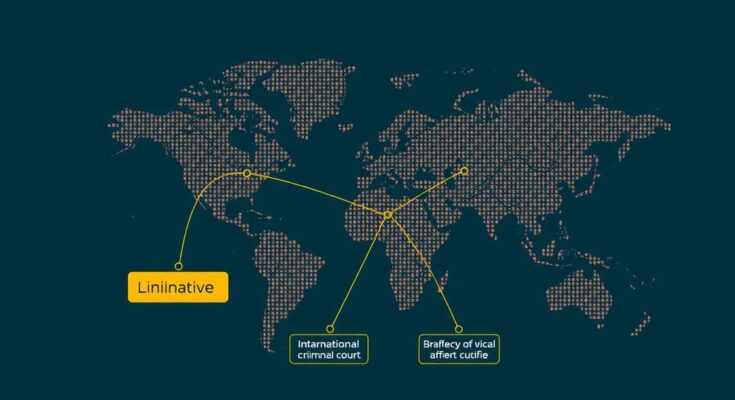The ICC faces challenges of underfunding and inefficiency but has a renewed opportunity for relevance with charges against Vladimir Putin and Benjamin Netanyahu. While it struggles with significant political resistance, a global movement advocating for justice fosters optimism, indicating that accountability for atrocity crimes may increasingly occur outside The Hague through universal jurisdiction and local tribunals.
In a quiet atmosphere at the International Criminal Court (ICC) in The Hague, where currently only one suspect is on trial for war crimes, hopes are being raised for the court’s relevance. Established in 2002 as the first permanence court addressing atrocity crimes, the ICC has jailed merely five individuals, all from Sub-Saharan Africa. Critics fear the ICC risks becoming a symbol of unfulfilled promise. However, with significant charges announced against notable figures like Russian President Vladimir Putin and Israeli Prime Minister Benjamin Netanyahu, the court is presented with a pivotal opportunity for legitimacy.
The ICC has often been criticized for inefficiency and underfunding, exemplified by a delayed investigation in Uganda that remains unresolved nearly two decades later. The ICC relies heavily on its member states to effectuate arrests, yet significant powers such as the United States, China, and Russia either do not recognize its authority or refuse compliance. Consequently, when the ICC’s indictments lack international backing, they can be disregarded as biased by the accused nations.
In light of these challenges, a growing movement towards accountability for atrocity crimes has arisen beyond the ICC’s framework. Numerous nations have adopted “universal jurisdiction” to prosecute war crimes independently, with the United States joining this initiative. Furthermore, local tribunals in war-affected nations, as well as evidence-gathering efforts from legal professionals in places like Ukraine, indicate that perpetrators are increasingly at risk of facing justice, albeit through alternative avenues rather than The Hague alone. Innovative legal developments suggest that corporate executives could also face prosecution, shifting the dimension of accountability for crimes committed in conflict zones.
Despite skepticism surrounding the ICC’s future prosecutions, a sense of optimism grows regarding a collective international push against atrocities, evidenced by heightened recognition towards Palestine in response to human rights concerns. The international landscape is evolving, and although high-profile figures like Putin and Netanyahu may evade direct justice presently, the trajectory towards accountability for war crimes appears to be gaining momentum globally.
The ongoing role of the International Criminal Court (ICC) has been marked by its establishment as a permanent institution to address atrocity crimes since 2002. With the ICC’s historical focus predominantly on African cases, skepticism surrounding its effectiveness has emerged, particularly in light of its limited capacity to indict significant world leaders. The current charges against leaders such as Vladimir Putin and Benjamin Netanyahu serve as a litmus test for the ICC’s relevance and capability in enforcing international law. Concurrently, expanding frameworks for accountability through universal jurisdiction and local tribunals indicate a shift in how atrocities are addressed worldwide, highlighting the need for a broader approach to international justice.
The ICC’s ability to hold powerful figures accountable remains in question, given its underfunding and reliance on cooperation from member states. However, a burgeoning global movement advocating for justice and the establishment of universal jurisdiction suggests an evolving landscape where perpetrators increasingly risk prosecution. Despite the ICC’s challenges, alternate routes toward accountability demonstrate a promising shift in the international response to atrocity crimes and the legacy of justice.
Original Source: www.channelnewsasia.com




